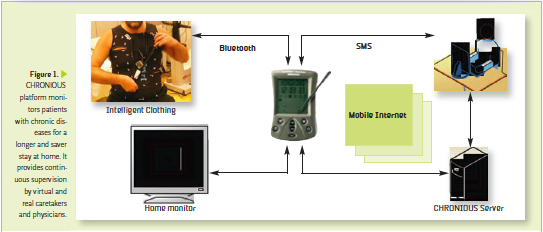By Michael Lawo
Among the initiatives aiming to improve health status monitoring technologies, the European Commission promotes CHRONIOUS, a 42-month project, started in February 2008 and involving 19 partners from several countries. The project (www.chronious.eu) works on an innovative, open and adaptive platform that includes overall a mobile and wearable system with intelligent sensors and decision support system for patients and healthcare professionals in the area of chronic diseases. It is a system to monitor patients’ vital body parameters, context, environmental variables, patient motion and other activities such as drug intake and dietary habits. Furthermore it is designed to detect patient’s abnormal health status, generating possible alerting information for the management of emergency situations critical for patients and health professionals. The system will assist health care experts and patients by providing tools for health status monitoring and decision support. The project aims to evaluate the platform on two specific chronic diseases: Chronic Obstructive Pulmonary Diseases (COPD) and Kidney Diseases. This paper describes the goal of the project and its background, the system architecture and a first prototype with preliminary results and the expected impact. The focus will be on the evaluation of the system prototype by user tests.
CHRONIOUS suggests the implementation of generic system architecture to be easily adapted to any chronic disease management program. For testing purposes, it focuses on two major chronic conditions, but the aim is to create an easily adapted system for other chronic diseases requirements.
With such an approach, quality of life can be improved and highly qualified and efficient healthcare services for citizens can be provided (e.g. through disease prevention, ubiquitous and seamless to the user monitoring, adaptive interaction based on user characteristics and context of activity, reduction of unnecessary visits to hospitals and complexity of selfcare especially for patients with chronic diseases). Advanced disease prediction and diagnosis tools, and the exploitation of the vast pool of monitored parameters are provided (e.g. vital signs are recorded for various users groups under diverse contexts and conditions) for the production of new diagnostic models and protocols. Thus the formal care burdens are reduced, and formal care improved (e.g. through the reduction of patient visits for routine examinations, the prevention, diagnosis and in some cases prognosis of diseases, and immediate intervention in emergency or time-critical situations). The approach mainly addresses two categories of users:
- patients, the real final users, who have to wear and interact with the system
- care providers, who have to use the system to remotely monitor the health conditions of the patients.
- Therefore it is important to understand and collect data about what these different subjects are expecting from the system, and the most suitable way to comply with their expectations: a successful system and products must begin with an understanding of the needs and requirements of users and must also satisfy compliance with ethical principles. With regard to local health institutions, professionals and hospitals, expected developments are the reduction of acute events and related hospitalization costs by up to 20-30%, by emergency cases alert, rationalization of medical prescriptions for diagnostic routine examinations, decision and education support services for professionals involved, stronger integration with home care service providers both in terms of shared clinical pathways and technological interoperability, quick and efficient medical information’s access through a logical, structured and certified pathway similar to human logic, sensible growth in cooperation and multiactor approach to chronic diseases and an enhancement in ICT investments. The expected impact on patients’ lives is high because wearable monitoring will be non-invasive, allow them to reduce routine visits to hospitals for diagnostic purposes, provide them with more tranquillity because of a reduction of time of intervention when occurring in time-critical situations, integrate a reminding and alerting service linked to particular behaviors such as drug intake, eating and activities performed, require an active participation of patients both in monitoring and in decision- making, and need availability of adequate ICT equipment at home and a friendly approach to new technologies by patients and their families. CHRONIOUS is multidisciplinary research project. In the ubiquitous health and lifestyle-monitoring domain it investigates and experiments with future visions and emerging technologies. The framework’s architecture and structure is generic and thus enables expansion to the support of the management of further chronic diseases. CHRONIOUS, in its very final form, will be a universal solution to healthcare facilities and professionals for managing all various types of chronic diseases, increasing the quality of patients’ lives and reducing health assistance costs.
With regard to local health institutions, professionals and hospitals, expected developments are the reduction of acute events and related hospitalization costs by up to 20-30%, by emergency cases alert, rationalization of medical prescriptions for diagnostic routine examinations, decision and education support services for professionals involved, stronger integration with home care service providers both in terms of shared clinical pathways and technological interoperability, quick and efficient medical information’s access through a logical, structured and certified pathway similar to human logic, sensible growth in cooperation and multiactor approach to chronic diseases and an enhancement in ICT investments.
The expected impact on patients’ lives is high because wearable monitoring will be non-invasive, allow them to reduce routine visits to hospitals for diagnostic purposes, provide them with more tranquillity because of a reduction of time of intervention when occurring in time-critical situations, integrate a reminding and alerting service linked to particular behaviors such as drug intake, eating and activities performed, require an active participation of patients both in monitoring and in decision- making, and need availability of adequate ICT equipment at home and a friendly approach to new technologies by patients and their families.
CHRONIOUS is multidisciplinary research project. In the ubiquitous health and lifestyle-monitoring domain it investigates and experiments with future visions and emerging technologies. The framework’s architecture and structure is generic and thus enables expansion to the support of the management of further chronic diseases. CHRONIOUS, in its very final form, will be a universal solution to healthcare facilities and professionals for managing all various types of chronic diseases, increasing the quality of patients’ lives and reducing health assistance costs.
Michael Lawo, Ph.D. Center for Computing Technologies (TZI) Universitaet Bremen Germany mlawo@tzi.de
About Brenda Wiederhold
President of Virtual Reality Medical Institute (VRMI) in Brussels, Belgium.
Executive VP Virtual Reality Medical Center (VRMC), based in San Diego and Los Angeles, California.
CEO of Interactive Media Institute a 501c3 non-profit
Clinical Instructor in Department of Psychiatry at UCSD
Founder of CyberPsychology, CyberTherapy, & Social Networking Conference
Visiting Professor at Catholic University Milan.







